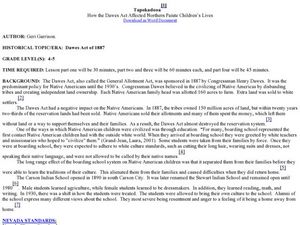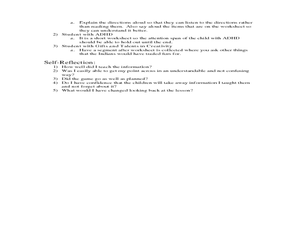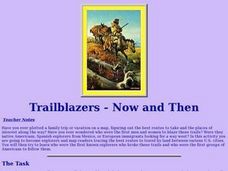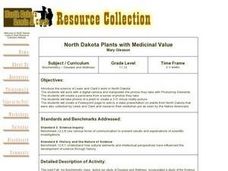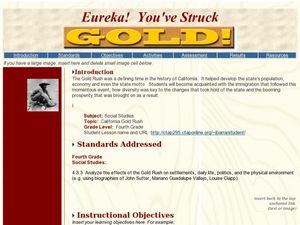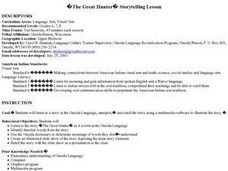Curated OER
The Four Corners Region of the United States Cultures, Ruins and Landmarks
Learners who live in the inner city are introduced to the four corners region of the United States. In groups, they examine how the region differs compared to where they live and their culture. They develop maps of the area and locate...
Curated OER
The Trail of Tears; Its Grief and Loss
Fifth graders trace the development and expansion of the US while studying the Trail of Tears. They examine the political factors and analyze the impact the Indian Removal Act had upon a society. They present a case for or against the...
Curated OER
Property, Theft and Generosity
Students examine excerpts of Lewis and Clark's journal entries during their expedition. They identify any disputes with the Indians over land and discuss how they might have been avoided. They add entries to their journals.
Curated OER
Taking Up Arms and the Challenge of Slavery in the Revolutionary Era
Students examine a series of documents which discuss the contradiction in the Americans' rhetoric about slavery. They act as members of designated Committees of Correspondence in the five different colonies, communicating their...
Curated OER
Tapokadooa: How the Dawes Act Affected Northern Paiute Children's Lives
Students investigate the Dawes Act and understand its effects on the Paiute Indians. For this Paiute lesson, students recognize that many Native Americans lost their land and money after the Dawes Act. Students dissect a worksheet for...
Curated OER
Whose Buffalo?
Seventh graders examine how the Plains Indians vied with white commercial buffalo hunters for the millions of Great Plains buffalo. They create an illustrated broadside supporting the interests of either the Indians or the commercial...
Curated OER
History And Tradition of Seminole Patchwork And Clothing
Students interview Seminole patchwork makers to find out about the history behind patchwork, how patchwork is made, and the meanings of various Seminole patchwork. Then they create some patchwork of their own.
Curated OER
Cornplanter and the Fate of His Land
Young scholars explore Chief Cornplanter and his importance as the leader of the Seneca tribe. In this Chief Cornplanter lesson, students examine how the Seneca land was taken over by the right of eminent domain. Young scholars answer...
Curated OER
Aboriginal Statistics
Fourth graders analyze statistics of Native Americans by creating graphs. For this data analysis lesson, 4th graders define different statistical terms and practice finding those statistics from groups of numerical information about...
Curated OER
La Salle and the Fur Trade
Fourth graders examine the fur trade of the 1700's. In this explorers lesson, 4th graders discuss how the French explorers traded items with the Native Americans for fur. They look at the explorer La Salle and how he influenced the fur...
Curated OER
Inference By Analogy
Students infer the use or meaning of items recovered from a North Carolina Native American site based on 17th-century European settlers' accounts and illustration.
Curated OER
Trailblazers- Now and Then
Students examine and study the routes of trailblazers. In this American history lesson plan, students find a route on a map and compare that to the route of trailblazers. Students will then compare that map with a topographical map to...
Curated OER
North Dakota Plants with Medicinal Value
Students use the internet and plant guides and other resources to identify plants and their medicinal importance as seen by the Native Americans. They view a copy of the Lewis and Clark journal that held photos of the plants of their...
Curated OER
CAPITALIZATION
Students write a class A,B,C book based on people and events important to the class. They use capital letters at the beginning of sentences and for proper names. They use periods at the end of sentences.
Curated OER
Eureka! You've Struck
While incomplete, this lesson could provide ideas for a lesson on the California gold rush. Learners look at a chart to analyze population growth in San Francisco after the discovery of gold, analyze political changes that occurred, and...
Curated OER
Heroes At Home
Young scholars present information on a Native American role model in the community to the class. They gain an understanding of what a role model is. They discuss role models and choose one to interview for their presentation to the class.
Curated OER
The Great Hunter Storytelling Lesson
Middle schoolers listen to and use resources to translate an old Oneida story told in the Oneida language by an elder in the community. They then develop an illustrated slideshow of the story.
Curated OER
Rock Art
First graders create and share their own rock art. They listen and read stories: "Mathematics from Many Cultures" and "The Legend of the Indian Paintbrush."
Curated OER
Maps of Indian Territory, the Dawes Act, and Will Rogers' Enrollment Case File
Learners, in groups, analyze one map at a time, first the 1885 map, then the 1891 map. After they have completed the analysis sheets, they compare the two maps and answer questions imbedded in the plan.
Curated OER
Seminole Traditional Foods
Students will identify and label Seminole foods in Miccosukee (native language) and English. They construct a chart on traditional Seminole foods and prepare a traditional Seminole meal.
Curated OER
Moving to the Frontier
Students explore the Frontier House website, examining the challenges of frontier settlement in the American West in the late 1800's. They develop budgets, and create displays based on their own research.
Curated OER
Navajo Shoe Game
Students in a Navajo community research the traditional shoe game. They interview community elders and find out how shoe game is played and the songs that are sung while playing it. They attend a shoe game and compare their research to...
Curated OER
Independent - To Be or Not Top Be: Say It Again, Uncle Sam
Fourth graders revise and edit an oral presentation on the American Revolution based on peer feedback. They refine their oral presentation style and pinpoint areas in need of improvement.
Curated OER
Grinding Stones # 2
Second graders discuss and explore the Navajo tradition of grinding with stones. They observe how the grinding stone is used and then they practice using the grinding stones themselves.
Other popular searches
- Native American Indians
- American Indians Lesson Plans
- U.s. American Indians
- Coastal American Indians
- Art Native American Indians
- American Indians of Virginia
- North American Indians
- First American Indians
- American Indians in Utah
- American Indians Utah
- American Indians Totem Poles
- Native American Indians Nj






